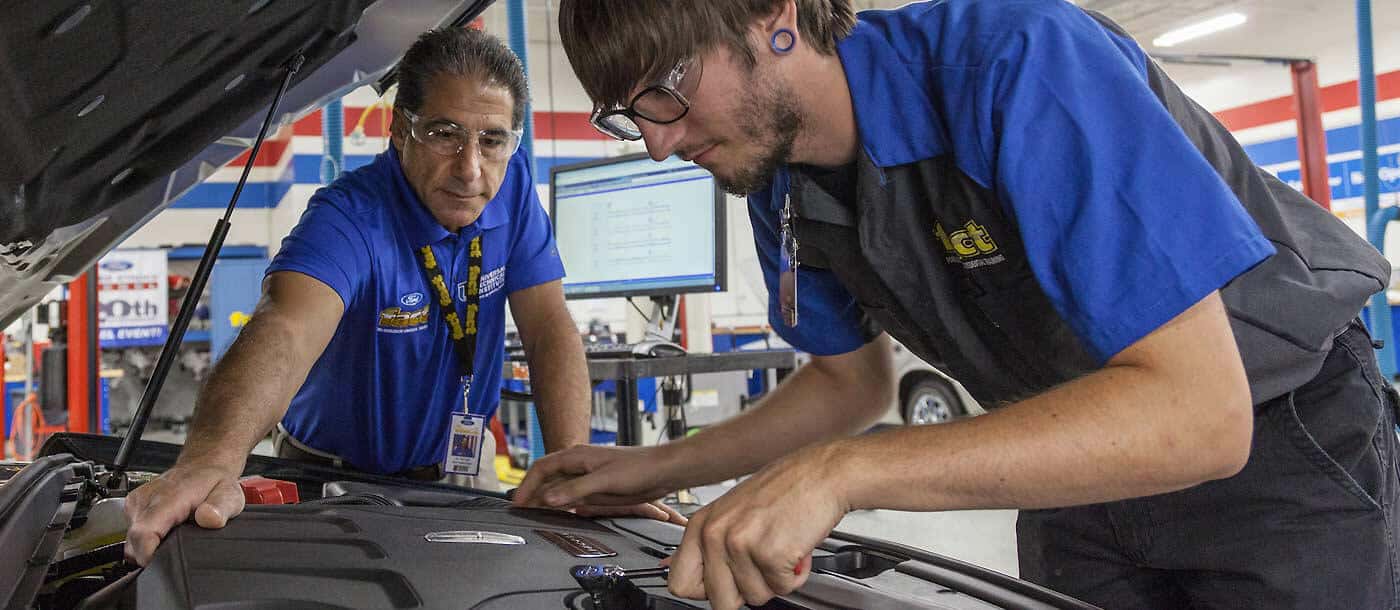Automotive specialized training at Universal Technical Institute (UTI) provides students with the kind of knowledge manufacturers and dealerships value.
After completing UTI’s core Automotive Technology program, graduates can apply to a Manufacturer-Specific Advanced Training (MSAT) program where instructors will teach them to service and repair vehicles from leading manufacturers like Ford and BMW, using current technology and systems unique to these brands.1
This specialized training can prepare students for career opportunities with these manufacturers and potentially set them apart from other entry-level technicians who do not have this training.
UTI MSAT Programs: Train on a Brand You Love
Automotive specialized training can be a great way to further your education and add specific skills to your resume that could help you stand out in the job market. A few of the auto specialized training course topics* covered in these programs include:
- Ford Quick Service and Light Repair
- BMW Electrical Technology
- Mercedes-Benz Diagnostics
- General Motors Vehicle Systems
- NASCAR Pit Crew
*Note that courses vary by MSAT program taken.
Click on your favorite brand below to learn how to apply or qualify for the program!
Overview of UTI's Automotive Specialized Training Programs
To qualify for one of the automotive specialized technology training programs, students must first complete UTI’s core Automotive Technology courses to ensure they have a foundational understanding of essential automotive skills.
After fulfilling the core curriculum, students can pursue a specialized training program, where they'll dive into service standards and techniques unique to the chosen manufacturer. Many of these specialized programs allow students to earn manufacturer-specific credentials valued by dealerships. Credentials vary by program, but a few credentials* that MSAT students can earn include:
- 14 Ford STST credentials
- Seven factory BMW credentials and may achieve a BMW Associate Level III Certification after BMW-specific ASE testing and hands-on assessment.
- Opportunity to earn Level 1 Stellantis Technician status
*Note that credentials depend on MSAT program taken.
These credentials may give graduates an edge, showcasing their readiness to work directly on a specific brands' vehicles. This targeted training can help them stand out to employers and service centers affiliated with the specific manufacturer, potentially opening doors that may not be available to other candidates who do not have this type of training.
Frequently Asked Questions
To qualify for an automotive Manufacturer-Specific Advanced Training (MSAT) program at Universal Technical Institute, you must first complete UTI’s core Automotive Technology program. Eligibility also depends on meeting GPA, attendance and other manufacturer-specific requirements, which vary by brand and program availability.11
UTI’s MSAT programs are built in partnership with top brands like BMW, Ford and GM and are designed to train students specifically on that manufacturer’s vehicles, systems and technologies.15 While each program focuses on one manufacturer’s brands, the skills and certifications gained can help you pursue opportunities across the broader automotive industry.
Demand can vary by region and economic trends, but many top manufacturers such as Ford, GM and BMW are actively seeking qualified technicians trained in their specific systems. UTI has relationships with more than 30 brands, and the specialized training offered through MSATs can help align your skills with employer needs in high-demand areas.
Completing an MSAT program can help you stand out to dealerships and service centers affiliated with that manufacturer’s brands. The training is developed with the manufacturer’s input and often includes brand-specific certifications, helping you pursue direct path toward employment within that manufacturer’s network.1

















